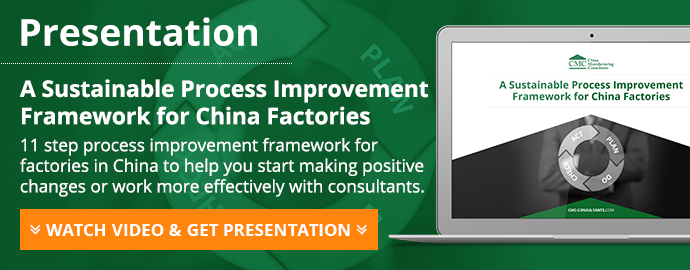Many factories will quickly offer the credentials, such as ISO certification, as proof of their production management systems. However, these are often used as a paper facade to mask what actually happens in the systems and processes of a factory.
Let's take a closer look at a recent factory visit to see how simple it can be to get beyond the veil and starting improving systems today.
Why Certifications Can Be Meaningless in a Production Management System
Production management visibility starts by asking for walk-throughs, not just certifications
I recently visited a factory on behalf of a client. They wanted me to see if the factory was capable of making the products that the company needed at the right cost and quality. When I called the supplier for an appointment, the representative asked me what standard I wanted to see: ISO or some other certification?
I told them I wanted to see their production systems and how the factory knew that the people were doing their work properly. I also asked about maintenance, incoming quality control, and how they developed their new products.
The representative in charge of sales asked me what I meant. I said, “Well, do you have FMEA’s, a preventative maintenance system for machines, the standard work instructions for the operators, etc.?”
She was very polite and told me those things were no problem. She asked if I could send her what I wanted to see, and she would have it all filled out for me by the time I came the next week. I said do not worry about it – I will just see her.
What I found, of course, is that they had little documentation relevant to what they actually do. They were ISO 9000 certified and had mountains of irrelevant paperwork that had nothing to do with their actual processes and procedures.
What is the purpose of "paperwork systems" in the manufacturing process then?
%3F.jpg?width=758&name=Blog%20Image%20-%20Are%20Your%20Production%20Management%20Systems%20For%20Real%20(Or%20Just%20For%20Show)%3F.jpg)
What I described I above happens very often in factories that we are asked to assess. You might be wondering then, “Why do they go through all this work to create meaningless documentation?”
Did some customer want these documents because it made them feel good? Did they request these, so they wouldn't have to check the factories for themselves?
Paperwork is part of standard procedure in China. Many customers expect some form of certification or documentation to prove the quality of the factory, without understanding these do not always represent what happens in the factory day-to-day. That is why the representative asked me what I wanted to see. They are used to showing a facade, and doing things just for show.
The logical follow up here is thinking, “If you are going to do all the work in order to fake something, why not just do it correctly?” That is the real question.
Having good process controls and data, using standard work instructions, an operating quality system, and good financial controls improve factory operations and help the company run more efficiently, increases profitability and makes the client happy with delivery and quality. Yet for too long, this is not what clients demanded. Chinese factories are just showing what clients wanted to see not what they need to see to tell if the factory is well-managed.
When you run the company properly and the correct systems have been put in place you then have no problem showing exactly what you do to a customer when they come.
How to Actually Improve Your Factory Management System
ISO is easy to complete and it is an honest system that actually helps you work if it is actually implemented as intended, and not just presented for show.
FMEA, statistical process control (SPC), standard work instructions, preventative and predictive maintenance, planning and inventory control, sourcing and honest purchasing practices, IQC, and other systems will make your factory run well. If you add in a lean manufacturing system you can save 30-50% of the money you are spending by not doing the systems correctly.
For Factories
If you are a factory, manage the factory correctly and you will get more business and save costs. Setting up your factory to be managed by real data and effective controls will make you better than your competitors. There are numerous case studies to show this.
For Buyers
If you are a customer, do not tolerate your factories not implementing their systems correctly. Ask the right questions, look beyond the paperwork, and you will be able to find good suppliers that will help you.





